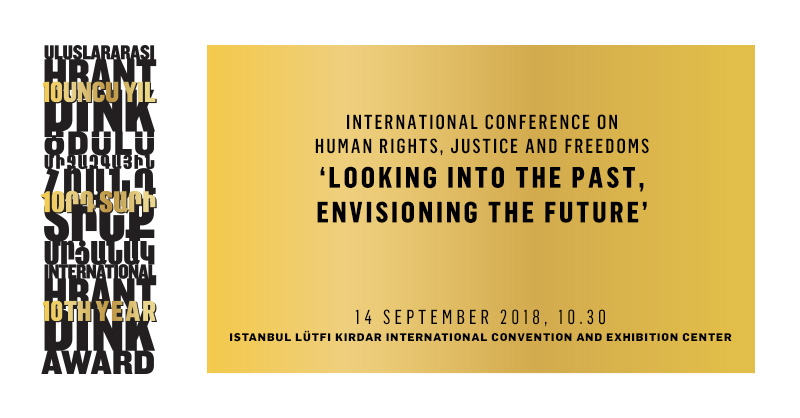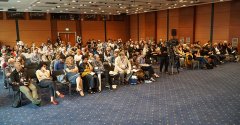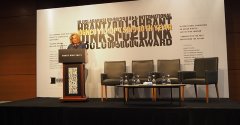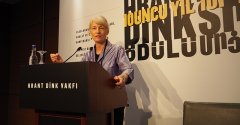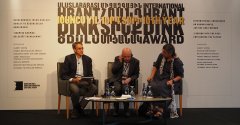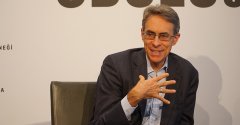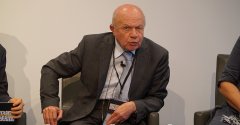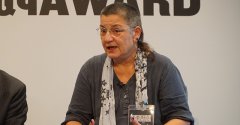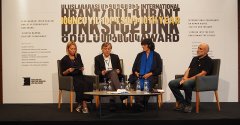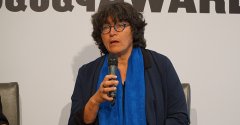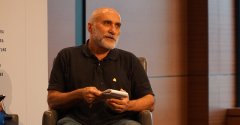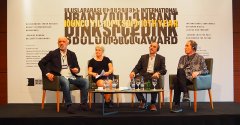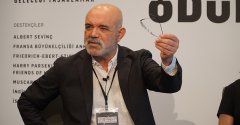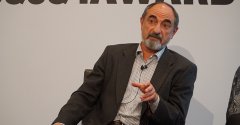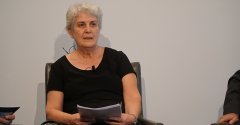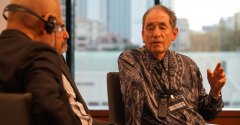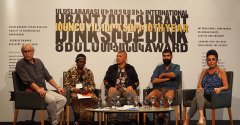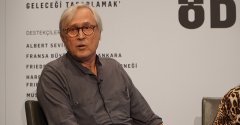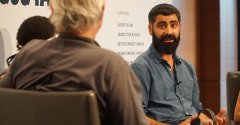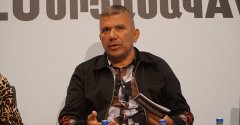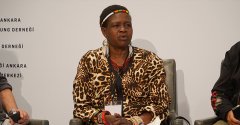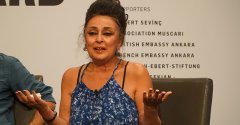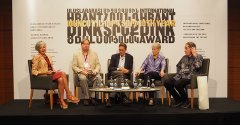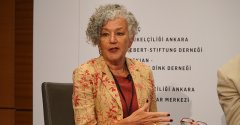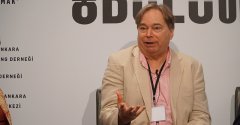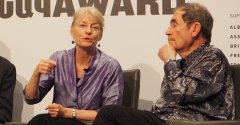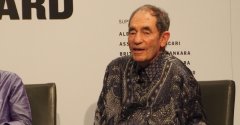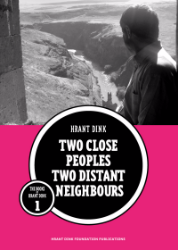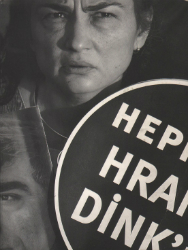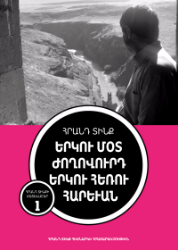On the occasion of the decennial of the award, International Hrant Dink Award laureates came together at the international conference titled ‘Looking into the Past, Envisioning the Future’ that addressed the issues of human rights, justice and freedoms. The conference took place in Istanbul at Lütfi Kırdar International Convention and Exhibition Center on September 14th, Friday.
Following Hrant Dink Foundation Board Member Sibel Asna’s welcome speech emphasizing the importance of solidarity for human rights struggle, Kathryn Sikkink, faculty member at Harvard University, and renowned human rights specialist, delivered the keynote speech. Sikkink underlined that human rights and treaties have always been earned through struggles and that we need a new coalition of actors and new international allies to sustain and develop the struggle, even if hope for the current situation of the world is weak.
Geçmişe Bakmak, Geleceği Tasarlamak Konferansı - Açılış
In the first session titled ‘Seeking Justice Against All Odds’ moderated by the Executive Director of Human Rights Watch and member of the 2014-2015 Hrant Dink Award Jury Kenneth Roth, 2012 laureate İsmail Beşikçi and 2014 laureate Şebnem Korur Fincancı delivered speeches. Emphasizing that the official ideology is the main determinant element of the Turkish politics, Beşikçi highlighted that science is the basic foundation of his struggle. Fincancı underlined the importance of continuing struggle for justice and considering impunity, torture and violations as parts of a whole.
Geçmişe Bakmak, Geleceği Tasarlamak Konferansı - 1. Oturum
https://hrantdink.org/images/odul/2018/konferans/foto/Konf_Oturum1.jpg
https://hrantdink.org/images/odul/2018/konferans/foto/Konf_KennethRoth.jpg
https://hrantdink.org/images/odul/2018/konferans/foto/Konf_IsmailBesikci.jpg
https://hrantdink.org/images/odul/2018/konferans/foto/Konf_SebnemKorurFincanci.jpg
Bekir Ağırdır, Board Member of the Hrant Dink Foundation, chaired the second session titled ‘The Role of Journalism and Information in a Polarized World’. The session started with the letter from 2011 laureate Ahmet Altan, which he sent from Silivri Prison. Altan emphasized that the number as well as the impact of the intellectuals are decreasing in the face of growing nationalism; and there is an urgent need for an intellectual opposition which can be an antidote to the current situation. 2009 laureates Alper Görmüş and Amira Hass were also panelists in the session. Hass who is reporting from the Palestinian occupied territories since the 1990s, emphasized the necessity of practicing journalism paralleled with activism. She stated that, in the context of a polarised society, production and dissemination of information and knowledge are not sufficient to combat violations and inequalities. Görmüş, on the other hand, stressed that practicing journalism in a polarized society is as hard as practicing journalism under a tyrannical rule.
Geçmişe Bakmak, Geleceği Tasarlamak Konferansı - 2. Oturum
In the third session titled ‘Collective Memory, Truth Seeking and Perseverance’, 2018-2019 jury member Ercan Kesal hosted 2012 laureate International ‘Memorial’ Society, 2013 laureate Saturday Mothers / People, and 2018-2019 jury member Albie Sachs. İkbal Eren, who spoke on behalf of the Saturday Mothers / People, stressed that coming to terms with the past forms the basis of a solid future. As their ‘disappeared’ relatives do not have a grave they can visit, Eren emphasized the symbolic and personal importance of visiting Galatasaray Square every week, with the hope that similar incidents will not take place again. Representing ‘Memorial’ Society, a collective that works on the issues of human rights, education, and history in the Soviet republics and Russia, Boris Belenkin detailed how the Russian state had intervened in the construction of collective memory and established absolute polarisation among the society. Sachs, a former judge who has fought against the apartheid regime in South Africa and who took part in drafting the South African constitution, said that a constitution making process was initiated thanks to the commitment of the people, also reminding the role of independent institutions in the process.
Geçmişe Bakmak, Geleceği Tasarlamak Konferansı - 3. Oturum
https://hrantdink.org/images/odul/2018/konferans/foto/Konf_Oturum3.jpg
https://hrantdink.org/images/odul/2018/konferans/foto/Konf_ErcanKesal.jpg
https://hrantdink.org/images/odul/2018/konferans/foto/Konf_Memorial.jpg
https://hrantdink.org/images/odul/2018/konferans/foto/Konf_CtesiAnneleri.jpg
https://hrantdink.org/images/odul/2018/konferans/foto/Konf_AlbieSachs.jpg
In the fourth session ‘Defending Human Rights, Freedom, and Equality’ moderated by Ali Bayramoğlu, Chair of the Award Committee between 2009 and 2015, the panellists were 2010 laureate Conscientious Objection Movement in Turkey, 2015 laureate KAOS GL, 2016 laureate Theresa Kachindamoto and 2017 laureate Eren Keskin. Representing the Conscientious Objection Movement in Turkey, Davut Erkan underlined that conscientious objection is not only a legal term, but a movement to create a stand against militarism. Ali Erol from KAOS GL mentioned that they have started their struggle 25 years ago, with a demand for equal citizenship. Erol stated that LGBTI+ individuals still face many problems concerning their access to healthcare and a safe shelter. Kachindamoto, a Malawi tribal chief, talked about her struggle against child marriages and for education rights. Referring to the tension between human rights and local traditions, she detailed how she revoked the marriage of more than three thousands girls through establishing dialogue with the local chiefs and signing legal contracts. Lawyer and activist Keskin stressed the importance of continuously questioning the values we defend during our fight, and stated that she sees human rights as the most emancipatory form of struggle.
Geçmişe Bakmak, Geleceği Tasarlamak Konferansı - 4. Oturum
https://hrantdink.org/images/odul/2018/konferans/foto/Konf_Oturum4.jpg
https://hrantdink.org/images/odul/2018/konferans/foto/Konf_AliBayramoglu.jpg
https://hrantdink.org/images/odul/2018/konferans/foto/Konf_VicdaniRetHareketi.jpg
https://hrantdink.org/images/odul/2018/konferans/foto/Konf_KaosGL.jpg
https://hrantdink.org/images/odul/2018/konferans/foto/Konf_TheresaKachindamoto.jpg
https://hrantdink.org/images/odul/2018/konferans/foto/Konf_ErenKeskin.jpg
In the closing session titled ‘Envisioning the Future of Human Rights’ moderated by Hrant Dink Foundation Board Member Ayşe Soysal, Roth, Sachs, Sikkink and Douglas A. Johnson delivered speeches. A human rights activist since the 1970s, Harvard University faculty member, and founder of New Tactics, Johnson pointed out that instead of seeking for the ‘best tactic,’ human rights organizations should form a repertoire of strategies. Sikkink, on the other hand, commented on the amnesia about the development of human rights struggle. Finally, Sachs talked about anti-apartheid movement in South Africa, emphasizing that the struggle united people who would never have come together. At the end of the conference, Sachs presented a copy of the South African bill of rights to Rakel Dink.
Geçmişe Bakmak, Geleceği Tasarlamak Konferansı - Kapanış
https://hrantdink.org/images/odul/2018/konferans/foto/Konf_RakelDink.jpg
https://hrantdink.org/images/odul/2018/konferans/foto/Konf_Kapanis_Genel.jpg
https://hrantdink.org/images/odul/2018/konferans/foto/Konf_AyseSoysal.jpg
https://hrantdink.org/images/odul/2018/konferans/foto/Konf_DouglasJohnson.jpg
https://hrantdink.org/images/odul/2018/konferans/foto/Konf_KennethRoth_2.jpg
https://hrantdink.org/images/odul/2018/konferans/foto/Konf_KathrynSikkink_2.jpg
https://hrantdink.org/images/odul/2018/konferans/foto/Konf_AlbieSachs_2.jpg
LIVE



